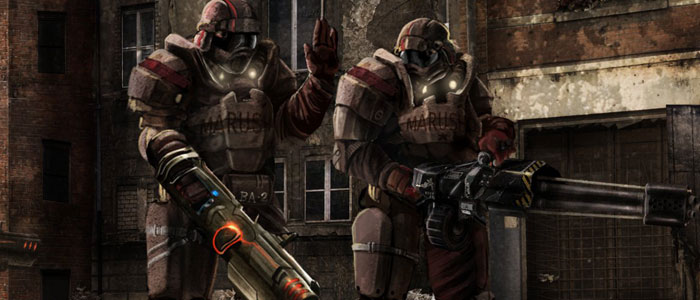FPS gamers and RTS aficionados approach gaming in different ways. One group prefers to be on the ground, picking off enemies one by one. The other amasses large forces and peers down from above as the troops annihilate the opposition. It’s not often that you can get these two different experiences from a single game, but Interwave Studios has set out to do just that with their upcoming title, Nuclear Dawn.
I had the opportunity to speak with Interwave’s Robbert van der Lee to find out what we can expect from this interesting merger of very different genres.

Michael Futter (MF): Robbert, thanks for taking the time to speak with me. We’re very interested to learn more about what makes Nuclear Dawn tick. The game features two different factions that feature different buildings and upgrades. Tell us a little bit about these two opposing forces.
Robbert van der Lee (RL): In Nuclear Dawn’s narrative, the two opposing factions emerged from actual, contemporary power blocs. The Consortium are a collection of Western countries that put individuality and personal honour above all else, and style themselves as the ’good guys’.
The Empire, on the other hand, are a coalition of Eastern cultures, united by imperialist China’s expansion, and they put their society’s well-being above the individual’s.
The two factions have unique looks, weapons, structures and building paradigms, though everything is balanced to ensure full equivalence between the two.
MF: The blend of FPS and RTS seems like it would be challenging to implement in a balanced fashion. How are you handling the two completely different systems without making the Commander overpowered?
RL: Separation of roles was the key. Players need the Commander to support their advance, provide supply stations, spawn points and artillery cover as they storm the enemy base and attempt to overwhelm its defences.
On the other hand, the Commander needs the players to capture and hold resource points, take out strategic targets and protect vulnerable installations before they are made secure.
Unlike other games, the Nuclear Dawn Commander can’t just step into his bunker, put up a structure or two, and then go join the fray. Commanders have a full time job, building, expanding and maintaining outposts, controlling enemy troop movements, directing their own soldiers, researching upgrades for both structures and players, all the while balancing the needs of warfare with limited resources.
The Commander is not overpowered in Nuclear Dawn, nor can he be, since he is not a player in the field, but an actual RTS commander who, should he choose to step out of the bunker in an emergency, will just be another soldier, but in fancier armour.

MF: What are some examples of how the commander can interact with the troops on the ground? How will the Commander interact differently with the four different troop classes?
RL: The Commander can directly interact with players by selecting their squads (or individual players), and assigning them order waypoints. Players in range of said waypoints will receive bonus points to any action performed that conforms with the Commander’s order.
Should the orders be unclear, there always is Faction and regular chat, alongside a series of automated messages that help clarify several situations. Being ordered to defend a structure takes on a special urgency if your UI is constantly warning of attacks on it.
Commanders can also unlock special ’Abilities’ that allow them to inflict damage on enemy troops, deploy poison clouds, or heal their troops, at a cost and with balanced cool-downs, of course.
Finally, there is the indirect, but very real, interaction of providing players with support, structures, spawn gates and supply stations, armouries and artillery cover.
